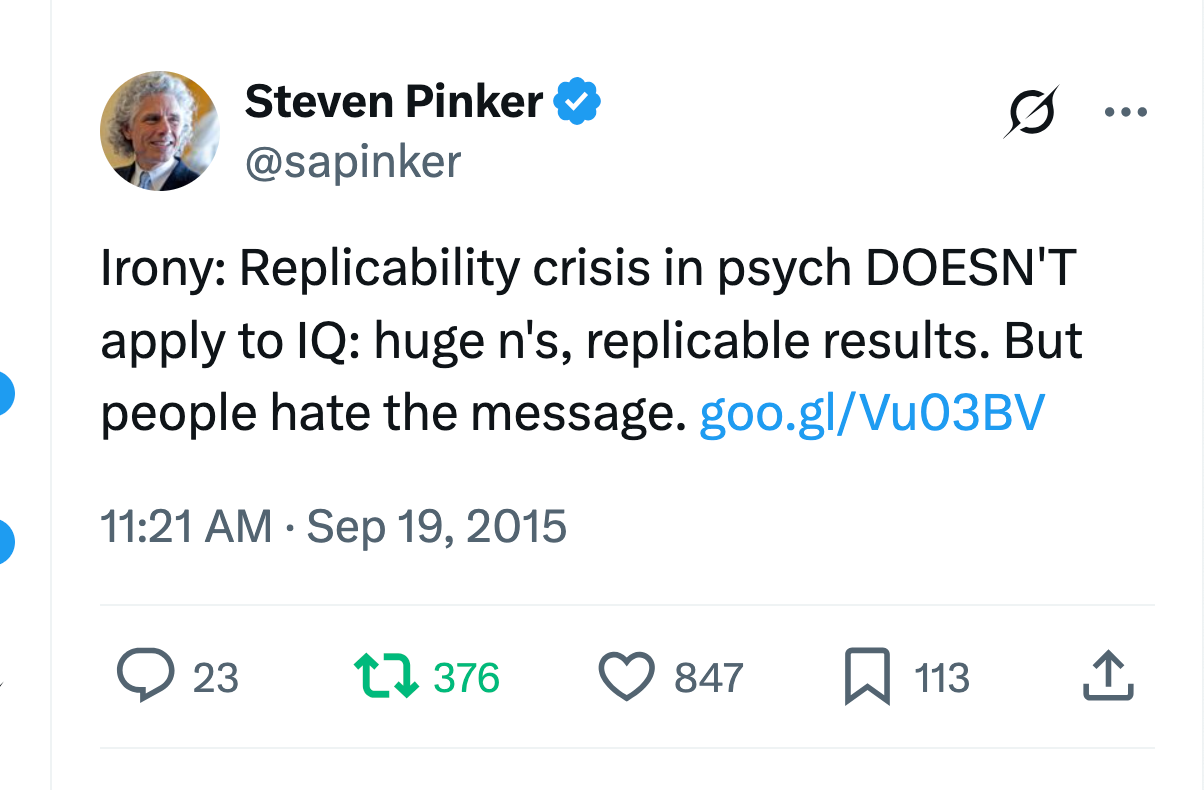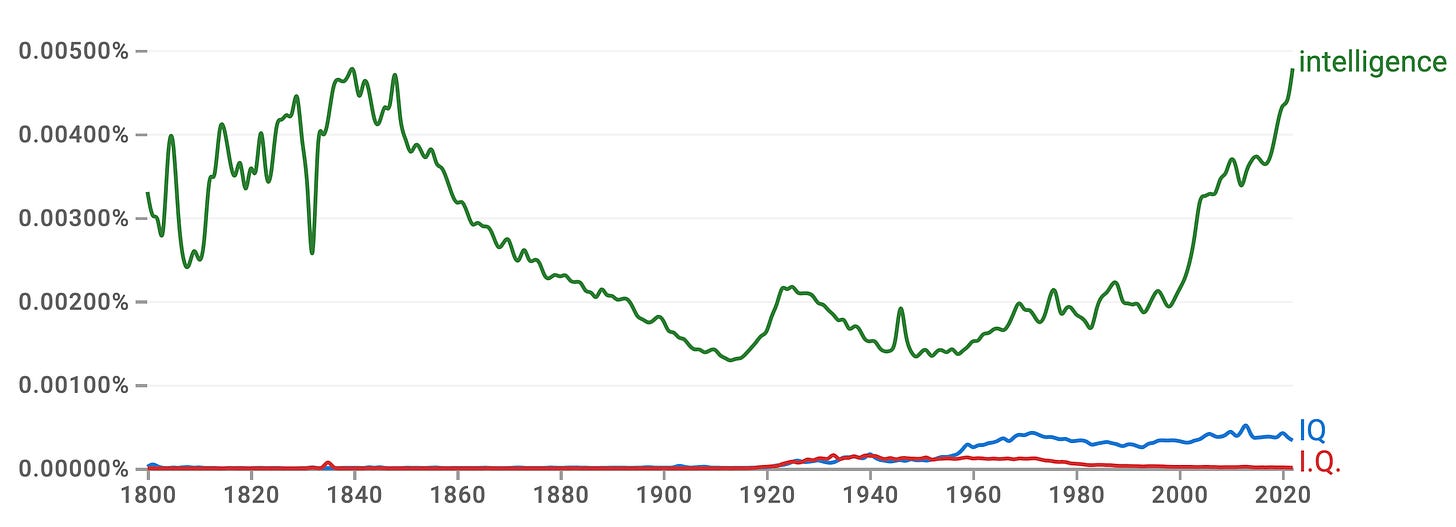What Is Elon Musk’s I.Q.?
Who seems more knowledgeable about cognitive science: Amanda Hess or Steven Pinker?
From the New York Times:
Critic’s Notebook
It’s of course an interesting question because Musk’s business accomplishments as an industrialist are so astonishing (running two radically different hardware companies in electric vehicles and rockets, plus SpaceX’s subsidiary Starlink, which is doing very well). I can recall driving around Beverly Hills in 2013 and seeing three Teslas. “Wow,” I said to myself, “Teslas are becoming as common in Beverly Hills as Lamborghinis. That’s amazing. I never thought they’d outsell McLarens. At this rate, someday Teslas might become as common as Ferraris!”
On the other hand, Musk’s not infallible as a tweeter and sometimes falls for obviously wrong ideas.
The questionable measure of intelligence has now been uncoupled from any test and loosed into the discourse to justify Silicon Valley’s power.
By Amanda Hess
Amanda Hess is a critic at large for the Culture section of The Times, covering the intersection of internet and pop culture.
April 5, 2025
Harvard cognitive science superstar Steven Pinker is not impressed with Ms. Hess’s essay:
It’s the usual Amanda Hess kind of thing:
For months, an internet-wide guessing game has swirled around the question of where Elon Musk’s intelligence falls on the bell curve. President Trump has called Musk a “seriously high I.Q. individual.” Musk’s onetime biographer Seth Abramson wrote on X that he would “peg his I.Q. as between 100 and 110,” and claimed that there was “zero evidence in his biography for anything higher.” The economics commentator Noah Smith estimated Musk’s I.Q. at more than 130, a number gleaned from his reported SAT score.
I’ll tell you Musk’s SAT score below the paywall.
A circulating screenshot shows Fox News has pegged the number at 155, citing Sociosite, a junk website. The pollster Nate Silver guessed that Musk is “probably even a ‘genius,’” and theorized that he may not always appear that way because, as he put it on X, “high I.Q.s serve as a force multiplier for both positive and negative traits.”
When we speculate about Musk’s I.Q., what are we really talking about?
Not his score on an intelligence test; if he has ever taken such a test, its results have not been made public.
Musk’s results are public on the pre-1995 SAT, which was one of the best cognitive tests ever.
Lots of Ivy League grads want to tell you that they got into the Ivy League but not tell you that they got in on what is basically an IQ test.
… For more than a century, psychologists have debated the extent to which an I.Q. test is capable of measuring a person’s inherent intellect (and if such a thing even exists).
Actually, the scientific debate was over a long time ago, as Steven Pinker pointed out a decade ago:
Now, “I.Q.” has been uncoupled from the test itself and loosed in the discourse to lend a scientific sheen to the consolidation of a new political elite.
Eh, the terms I.Q. and IQ have been used fairly steadily in American books for much of the last century according to Google’s Ngram:
Paywall here. Lots below it.
The word intelligence is used more lately than at any time since the Romantic Era, but that might have something to do with 9-11-style CIA intelligence rather than with IQ.
… Trump has spent much of his second term sorting humans into “low I.Q. individuals” (Kamala Harris, Representative Al Green) and “high I.Q. individuals” (cryptocurrency boosters, Musk, Musk’s 4-year-old son).
But a wider public fascination with I.Q. is in the water. (Sometimes literally: Robert F. Kennedy Jr. has opposed the fluoridation of tap water, claiming that it causes a decrease in I.Q.) Musk’s Department of Government Efficiency is seeking “super high-I.Q.” applicants….
Intelligence testing would not arise until the 20th century, and the abbreviation “I.Q.” in 1922, but an early metric of intelligence was established by Francis Galton in his 1869 book, “Hereditary Genius.” Galton, a cousin of Charles Darwin,
Darwin was a huge admirer of Galton, but criticizing Darwin would please the Evangelicals, so Galton is the Bad Guy while Darwin remains the Good Guy, although the way Science Denialism is growing, soon Darwin may become a Bad Guy too.
was a leading proponent of social Darwinism, a pseudoscientific effort to organize human society around the promotion of the “survival of the fittest.”
Eh, more Herbert Spencer than Galton.
Galton founded both the ideology of eugenics and the field of psychometrics — the application of objective measurement to the study of human psychology. In his book, he attempted a statistical analysis of human intelligence and argued that it was a heritable trait. He claimed that men who are “naturally capable” are nearly identical to those who “achieve eminence,” and charted dense genetic connections among various illustrious English judges, statesmen and artists. Nepotism was laundered into evidence of inherent superiority.
Obviously, the upper crust sons who went into law rather than into the cavalry or the C. of E. were the dumber ones.
Then along came the I.Q. test, which formalized the scientific nature of the inquiry — or at least its scientific feeling. In 1905, the French psychologist Alfred Binet, with the psychiatrist Théodore Simon, developed the first intelligence scale in order to identify schoolchildren in need of remedial instruction. In 1916, the American eugenicist Lewis Terman adapted the test to create The Stanford-Binet scale, named after the university that employed him.
And that’s why you never hear about Stanford anymore.
Terman’s initial tests, organized by age, were overt in their cultural biases: 7-year-olds were asked to describe an illustration of a crying Dutch girl in wooden shoes; 14-year-olds were asked to list three differences between a president and a king; adults were asked to interpret the implied lessons of fables.
Wow, you mean, it took scientists a few decades, such as into the 1930s, to get really good at this new field of science? Well, that just proves it’s pseudoscience!
Though “I.Q.” suggests that human intelligence is a singular and fixed genetic quality, like height,
Height is definitely not a “fixed genetic quality:” South Koreans are a half foot taller than their ancestors. They also score higher on standardized tests than their grandparents did.
I’ve pointed this out dozens of times, but I’m of course the unmentionable Lord Voldemort because I’m too moderate and reasonable. Or something.
what the test most reliably determines is how well a person performs on an intelligence test.
Ooh, clever! But of course, IQ tests also predict better than many other measures how people on a host of measures, such as war-fighting, which is why Congress banned the military from enlisting anybody in the bottom 10% of AFQT back in the Korean War.
The results “have always produced a kind of photograph of the existing class structure, in which the better-off economic and ethnic groups are found to be more intelligent and the worse-off are found to be less so,” the journalist Nicholas Lemann writes.
Whoever heard of Jews or Asians?
The current version of the test aims to measure fluid reasoning, quantitative reasoning, visual-spatial processing, working memory and accumulated knowledge — perhaps not coincidentally, the same forms of intelligence that are prized in the technology industry.
That might suggest that the Terman family were onto something a century ago. Or obviously, all those trillions of dollars of wealth generated in the Stanford neighborhood over the last century are just a big conspiracy to make IQ tests look good.
In his 2023 history “Palo Alto,” Malcolm Harris writes of Stanford as an institution built on eugenic thinking. Before Leland Stanford founded Stanford University, he established what he called the “Palo Alto System” to classify, train and breed superior racehorses at an intense pace of production — a system that sometimes resulted in the snapped tendons of weaker colts but had the benefit of weeding out inferior horses before investing too much in their development.
The weird thing that I’ve never quite understood is that eugenics has been a big flop over the last half century in horse racing, even though racehorse breeding has obsessed the English going back to Shakespeare’s time. The record times set by Secretariat in 1973 in Triple Crown races still endure over a half century later.
Diminishing marginal returns?
Secretariat had a colossally large heart plus the infrastructure to support it.
Secretariat was a good sire, but Northern Dancer was a great sire because whatever the most valuable genes he had going for him didn’t require a bunch of other genes.
Once Stanford applied this punishing system to human achievement, it seeded a century-long obsession with intelligence scoring in Silicon Valley — and in the America that it increasingly shaped.
And of course Silicon Valley failed completely.
Oh, wait, that didn’t happen …
The Binet-Simon test had an inclusive aim: Disabled children in France were at risk of being removed to asylums; by charting all students on the same intelligence scale, those children could instead be kept in schools and recommended for adaptive education.
But the Stanford-Binet scale was generalized into an intelligence test that could be used to measure and rank all humans, and assign them a score relative to a norm of 100. Soon Terman had enrolled his own son Frederick in a study of child “geniuses”
I mean, what did Frederick Terman ever do? Besides become Stanford Dean of Engineering, the mentor of Hewlett & Packard, and garner perhaps the best claim to the title of Father of Silicon Valley? (But, no, contra the NYT, Fred Terman was not one of Terman’s Termites in his father’s epochal study of gifted children that did much to improve society’s attitude toward the precociously intelligent.)
and shopped his findings to the U.S. military.
Who have been using cognitive testing ever since.
It was America that pioneered the use of I.Q. for punitive ends, using low scores to deny certain immigrants entry to the country, to forcibly sterilize disabled people, and to push low-ranking soldiers into the line of fire while elevating high scorers to officer positions.
After all, no lieutenant ever gets shot at.
The IQ scientists also got low IQ people excused from the draft. In contrast, during the 1960s, Robert MacNamara put 100,000 of MacNamara’s Morons into the military against Congress’s orders.
And that proved a disaster.
Though the crimes of Nazi Germany compromised the global popularity of eugenics, and encouraged the disavowal of the word, the British and American victories in the World War II also worked as an endorsement of the use of I.Q. testing in organizing war and, more generally, identifying elites….
For example, in the mid-1950s, Harvard, wishing to increase the brainpower of its students, stopped putting an upper quota on the number of high-scoring Jews it would accept.
How’d that work out for Harvard?
Trump echoed the Palo Alto System (and the eugenic programs it engendered) at a January victory rally, where he declared Musk’s 4-year-old son to be highly intelligent — not because he has any particular insight into early child development but because he knows who the child’s father is. “If you believe in the racehorse theory, he’s got a nice, smart son,” Trump said….
Does Amanda Hess not believe in the Racehorse Theory?
Really, Amanda?
So, what about Musk?
Musk, who was born in 1971, took the SAT twice in the late eighties or early nineties, according to Walter Isaacson’s semi-authorized biography. This was back when the SAT was seriously correlated with IQ. On his second try, he scored 730 Math and 670 Verbal or 1400, which would be a score in the 1500s today.
That’s a very good test score, especially on Verbal, which averaged very low scores back before the big inflation in 1995 that added about 90 points to Verbal scores and about 10 points to Math scores. But a 730 in math was not particularly spectacular at the time. I went to Rice U. in the late 1970s, a good but not exactly Caltech STEM school. I often heard discussions about the difference between real Math 800s and the Math 800s that my humble friends scored.
Musk attended Penn, a fine Ivy League college with a famous business program, rather than MIT or Caltech.
The average verbal score of college-bound seniors in 1988 was 428 and average math score was 476, total 904. So, Musk scored 496 points over the mean.
The standard deviation was planned in the 1940s to be 200 for the full test, but it appears to have risen to about 220 before the Great Inflation of 1995. So Musk scored about 2.25 standard deviations above the mean for college-bound seniors (as opposed to the entire population). So, that implies an IQ in the 130s, maybe the 140s: very strong but not incredible.
Bill Gates is often said to have scored close to perfect, a 1590 that took him to Harvard. A friend of mine became an executive at Microsoft and friend of Gates when he volunteered himself and his wife to go skydiving with Gates and his girlfriend. A decade later, he appeared to be on track towards succeeding Steve Ballmer as Chief Operating Officer before before dying at age 37 of the same cancer I came down with at 38.
He told me Gates was astonishingly smart.
I believed him.
A 2000 article about Jeff Bezos in the Washington Post attributes a 1450 to him.
According to Isaacson, Musk was admitted into the Materials Science Engineering Ph.D. program at Stanford but did not enroll as he chose instead to make his first two fortunes in the Internet bubble with software products. I’ve never seen any reference to his GRE scores, but presumably they were pretty good to get into Stanford.
What makes Musk so distinctive was that he didn’t stick with software like virtually everybody else of his generation, but instead switched to hardware, old-fashioned 20th Century American hardware: cars and rockets. And he didn’t do it on a boutique scale like other guys who got rich in the Internet bubble and then fooled around with exotic cars or rocket ships. Instead, he went all in on mass production in America, something that seemed over and done with, like from a Henry Ford biography.
Does Musk have a peculiar genius for organizing factories like Ford did? Or do Americans just not care enough about large scale industry anymore that there wasn’t much competition for Musk?
Amanda Hess doesn't appear to have noticed, but the 2020s have vindicated the usefulness of IQ-like tests in spectacular fashion.
America's elite colleges have recently inflicted on themselves a grand experiment in not using the SAT or ACT college admissions tests, with most colleges making submitting test scores optional, and the University of California taking the extremist step of banning applicants from submitting any test scores.
How's that going, anyway?
MIT took the lead in switching back to requiring test scores from applicants (as well as taking the lead in getting rid of DEI loyalty oath statements for job applicants and at least partly obeying the Supreme Court's 2023 decision banning affirmative action racial preferences).
The return to using IQ-like standardized admissions tests has come due to the poor performance of many admitted without them: Harvard, for example, had to create a remedial math course for admittees who turned out to not be good at things like basic algebra.







Steve's in his wheelhouse.
I’ll bet you dollars to doughnuts that Amanda Hess is a fervent believer in IQ when it’s used to spare those who score lower than 85 from the death penalty.